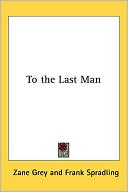

 |

|

The average rating for To the Last Man based on 2 reviews is 2 stars.
Review # 1 was written on 2013-12-23 00:00:00 Randy Schaefer Randy SchaeferRutgers law professor David Dante Troutt has written a sexy thriller fueled by racial indignation, but not enough. The Importance of Being Dangerous, his first novel, starts off with a sharp critique of American inequality, focused on three middle-class blacks. They're trying to make ends meet in Harlem during the 1990s stock market boom that's lifting all (white) boats. At the center of the story is Sidarra, a hardworking, single mom behind on her rent, her taxes and her love life. Hoping to get out of debt and secure a better future for her young daughter, she joins a local investment club for "people like her who knew nothing and had little but a job." There she meets Yakoob, a computer programmer, and Griff, a handsome civil rights lawyer. Disillusionment has corroded all their hopes. Griff eschewed a lucrative corporate practice to counter what he calls the "thug multiplier": the tendency of a racist legal system to exagerrate the crimes of black men. But he's found no more success or satisfaction than Sidarra, once a wide-eyed teacher, who now suffers daily humiliations from whites at the Department of Education. While playing pool after their weekly investment meetings, Yakoob, Griff and Sidarra swap stories of offenses they've endured or heard about. One night, they notice an insidious financial connection between the school system that miseducates young black men and the prison system that incarcerates them. It's an unsettling argument, the kind of outlandish conspiracy theory that sounds naggingly persuasive. Determined to fight back in some small way, Griff suggests a "game of selective reprisal and secretly just desserts." It's called Whiteboy: Each week, they nominate someone who profits by repressing African Americans, and they steal his credit card and bank account numbers to siphon off a few thousand dollars of reparations -- a payment on America's outstanding obligation. The Feds don't have anything to worry about here: The mechanics of these thefts are left impossibly vague. Just a few weeks before, this trio of black Robin Hoods thought a bank CD was music from a bank, but soon they're hacking into the country's largest brokerage firm and setting up offshore shell corporations. If it were that easy, I wouldn't be stuck reviewing books, but obviously Troutt is more interested in the sociological complications of this crime than the financial ones. Unfortunately, though, before he can fulfill the potential of his aggressive critique of America's racist economy, the novel is upstaged by the more conventional thrills of a white-collar crime. And everything's overshadowed by the hot and bothered drama of Sidarra's affair with Griff, "the kind of crazy fine man you have long stopped waiting for...[with] the sculpted cheeks of the African warrior chiefs you used to see on those beer commercial posters in the '70s." More disappointing is the way the novel sells itself out to consumer fantasy. Flush with her stolen bounty, Sidarra begins to feel her life is "a little unreal, like she had been simply walking on the wrong side of the street all the time." What began as a proud, though criminal, act of retribution fizzles into a giddy buying frenzy -- $200 facials, granite countertops, a new Mercedes. Sure, it's fun being queen for the day, but Troutt had been challenging us to imagine something far more profound. Ultimately, Sidarra and Griff's battle against the corrosive effects of American racism isn't transformative or revolutionary at all; it's just a pursuit of the same vacuous materialism of rich white people. I have a dream -- and it's a new Gucci purse. This is consistent with Troutt's pale allusion to one of the most provocative teachings of Elijah Muhammad. Nobody in the novel mentions it, but according to the Nation of Islam, "Yakub" was an evil black scientist who created the devilish white race. In The Importance of Being Dangerous, Yakoob, the rogue computer scientist, creates a similarly destructive figure, a young drug dealer named Raul. Yakoob cleans him up, outfits him in fancy threads and tries to teach him to comport himself, but Raul remains a shadowy, terrifying character who works behind the scenes, carrying out grisly murders. He eventually threatens to destroy everything Griff and Sidarra have made. These parallels would seem to tap into the Yakub legend, except that Raul is black, a detail that scrambles the radical implications of Elijah Muhammad's myth. Yakoob's relation to the Nation of Islam seems finally no more consequential than the title's allusion to Oscar Wilde. There's plenty here to quicken the pulse and even tug on our sympathies, but something more unsettling is lost along the way toward producing a nice, safe thriller, and that's too bad. Sometimes, it's important for a novelist to be dangerous, too. |
Review # 2 was written on 2010-10-18 00:00:00 David Paul David PaulI'd give this book 2.5 stars if it was an option. The first half was really good and involving. The second half contained alot of morally unsupportable justifications for murder, drug dealing and theft. And the ending .... I suppose we are supposed to cheer the lack of jailtime for our heroine, but I just couldn't. |
CAN'T FIND WHAT YOU'RE LOOKING FOR? CLICK HERE!!!